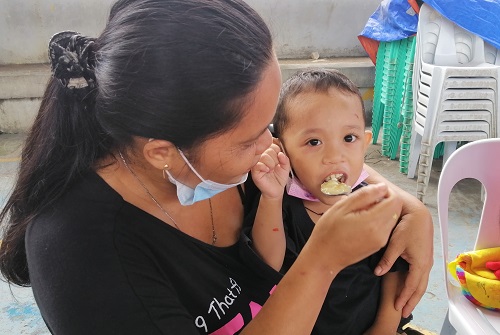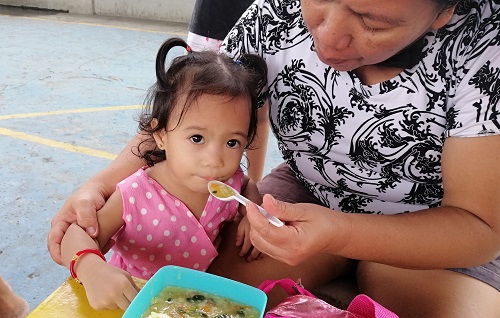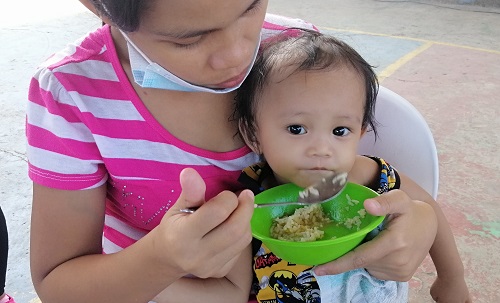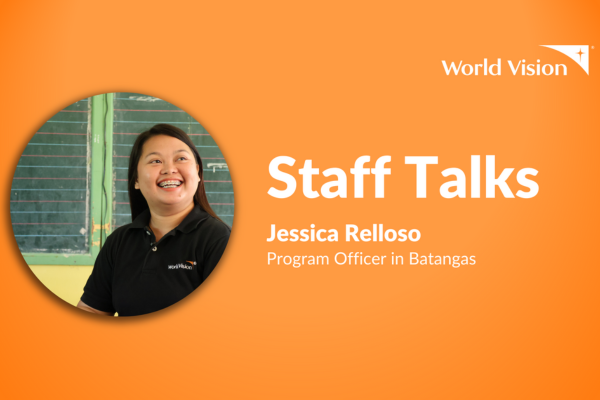Urban poor families find way to curb malnutrition amid pandemic
Families in an urban community in Cebu, Philippines are now prepared to combat the impact of the COVID-19 pandemic towards their health and nutrition after they are trained by World Vision about health practices and nutritious meal feeding.

While the COVID-19 virus continues its rampage across the globe, hunger and malnutrition are silent killers that sneaks into everyone’s houses and affects the health of families especially the children. Hunger rate is reportedly increasing across the globe as the pandemic affects people’s source of income.
In the Philippines, a Social Weather Stations (SWS) survey conducted last May 2020 indicates 16.7% of all Filipinos are experiencing hunger. This rate is doubled compared to 8.8 percent in December 2019 and it accounts for around 4.2 million individuals.
Shirley, a young mother from Mandaue City, was worried with her 1-year-old child Zia when she was considered as underweight by their local health officer. She only weighed 7 kilos – 2 kilos short of the average weight for female child – during her check-up last December 2020. The mother shared that their family’s daily food intake was lessened when her father who is their breadwinner lost his painting during the start of community quarantine.

Zia was not suffering alone from weight loss as many children in her urban poor village were experiencing the same plight.
“We are seeing more and more children who are underweight or rapidly losing weight simply because their parents have lost their jobs and can no longer afford to put healthy food on the table,” says Clareneth San Valentin, World Vision Philippines Health and Nutrition Manager. “This pandemic worsens the status of nutrition in the country. This puts children’s immediate health in danger, while we also see the potential impact of chronic malnutrition such as stunted, physical growth and delayed cognitive development.”
However, a brewing optimism is being felt in Shirley’s community which started in June this year. Zia and the many underweight children in Mandaue were invited to join World Vision’s nutrition program named, Urban Nutrition Hub (UNH).
UNH is a 12-session feeding program that provides undernourished children sustained nutritional feeding for them to recovery from their nutrition deficiency. During the sessions, World Vision also invites nutrition experts to teach the parents about cooking tips to prepare a healthy meal using accessible ingredients.
Aside from the feeding program, the participants also receive gardening tools and vegetable seeds to start up their backyard gardens to sustain their nutritious feeding at home. They initially received 25 kilos of rice for participating the first phase of the project. They will receive the same if they complete each phase up to four phases.
Junita, a 43-year-old mother, shares the importance of the feeding activity during the time of the pandemic. “Two of my children are enrolled in this nutrition program and I can really see the changes after attending many sessions. They already gained weight and their appetite has improved. At home, they’re no longer picky with vegetables ,” says the mother.

The UNH project is a sub activity under World Vision’s Urban Development Program (UDP). It is a World Vision project that covers two highly urbanized poor communities in Mandaue City. It is a 3-year grant project supported by sponsors from Singapore. The project started in August last year.
The project’s goal is to ensure that children and the youth in urban poor communities are well-nourished, educated, and empowered to live a safe and productive life. It aims to support 800 children aged 0-5 years old, 800 children aged 6-14 years old, 150 out-of-school youth aged 15-17 years old, 1000 night school students, 700 mothers or caregivers, 75 community health workers and educators, and 150 community local partners through various health and education activities.
World Vision and its community volunteers also ensure that health safety protocols such as wearing of mask, social distancing, and limited number of mass gathering are followed to keep the participants safe.
“Starting the urban nutrition hub with integrated urban gardening inputs gives children a chance to recover from underweight status. At the same time, families are given opportunity to grow their own vegetables at home so that they will no longer run out of food supply,” shares Rey Angelo Dahonan, Program Officer of World Vision’s Urban Development Program.








